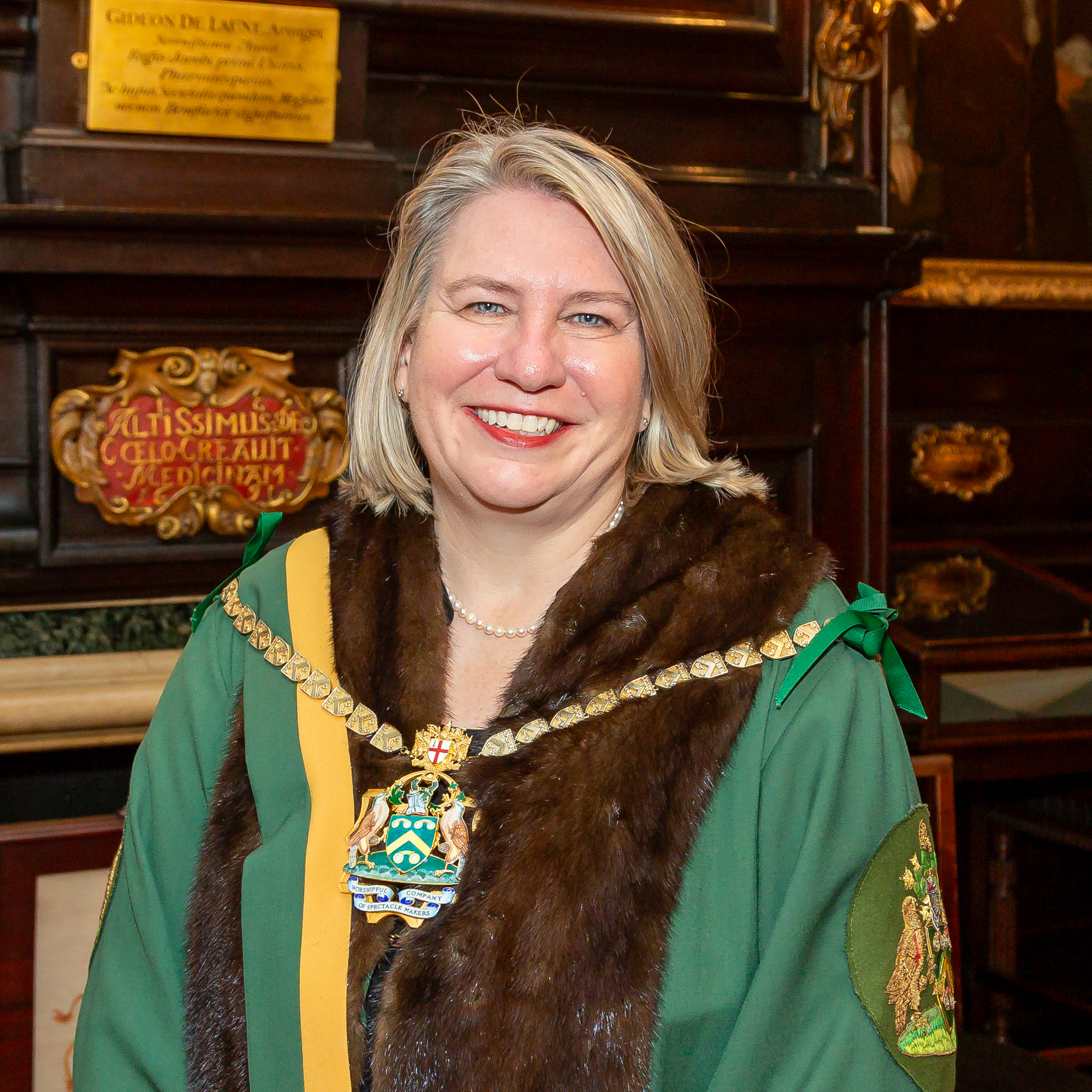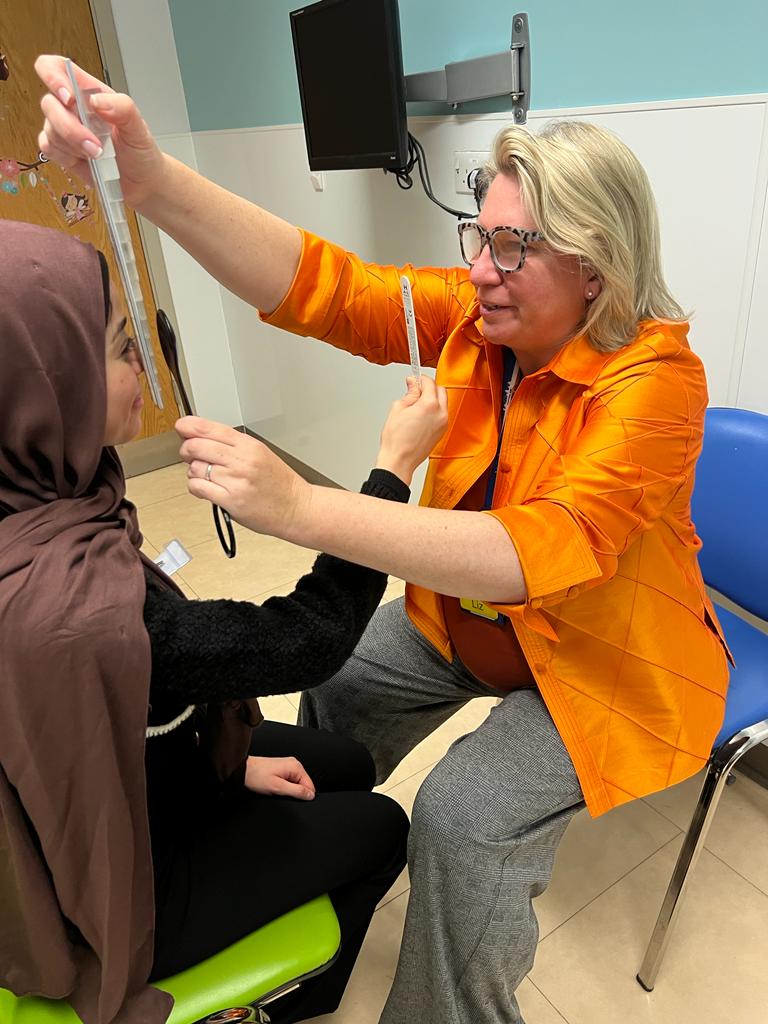Take 5 with Liz Shilling

Master of the Worshipful Company of Spectacle Makers, Liz Shilling
Nicky Collinson speaks with Liz Shilling – Master of the Worshipful Company of Spectacle Makers – about collaborative working, the role of the dispensing optician, and her hopes for her time in office.
Nicky: You’re the first orthoptist to become Master of the Worshipful Company of Spectacle Makers (WCSM). What does that mean to you personally, and professionally?
Liz: It is a great honour to be the first orthoptist Master in the Company’s almost 400-year history. Orthoptists are one of the smaller groups working in eye health care. There are about 903 orthoptists working in the UK– that’s less than 10 per cent of the number of dispensing opticians (DOs). We fall within the allied health professionals group – a very wide group of professions including radiographers, physiotherapists, dieticians, podiatrists and paramedics – but most importantly we are part of the ophthalmology multi-disciplinary team (MDT).
Orthoptists specialise in assessing vision in people who can’t read down the chart, that’s new born babies through until a child can read a line of letters, maybe at four or five years of age. Orthoptists also measure and assess squint and binocular vision.
Eye movement assessment is a fascinating area. I’m sure you know that when you look to the left, your left eye uses the lateral rectus and the right eye uses the medial rectus. From this horizontal eye movement, we can see orbital diseases such as thyroid eye disease, muscle problems like myositis, or weakness of the sixth and third cranial nerve. Problems with the horizontal gaze centre of the para pontine reticular formation can also be seen.
Orthoptists can then also identify any problems such as trauma stroke or multiple sclerosis seen in the medial longitudinal fasciculus. So you can see how just looking to the left is fascinating. Not to mention the identification of Duane’s retraction syndrome, Brown’s syndrome or fourth nerve palsy in the same movement.
The public – and teachers and advisers who talk about careers – have no idea of all this. Having a job that means I can make such a difference to people’s lives is something I want to shout about. That’s why I am so proud to be able to promote orthoptists in my year of office.
Nicky: You have spent your career championing extended roles and professional collaboration. How would you like to see these causes progress for dispensing opticians?
Liz: Orthoptists, DOs, optometrists and ophthalmic nurses now work beyond what was seen as their ‘traditional fields’. We need a team approach, with professionals from a range of backgrounds all building their skills and learning from each other.
Orthoptists cannot do their job alone. I have strong relationships with my MDT at the hospital and in the community. I believe it is essential for orthoptists to have a really good working relationship with our community optometrists and DOs so care is joined up. The dispensing of children’s frames is so important for our work and achieving a good visual outcome. Orthoptists rely on DOs to supply children with comfortable well-fitting glasses that they will actually wear. I have had paediatric patients in the past who have just flushed uncomfortable spectacles down the loo.
I think all DOs should be able to do a cover test in primary position, elevation and depression and identify A and V patterns. This informs their dispensing for varifocals or lenses. Limited eye movement conditions, such as thyroid eye disease and myasthenia gravis, often lead to complex dispensing problems. I often prescribe prisms and ptosis props when this is the best option for patients, but you really need a good DO to enable these solutions to work. I put my contact details on prism prescriptions so the DO can contact me quickly with any questions. By working together, we can all provide better patient care.
In my role as WCSM Master, I try on every occasion to promote the importance of eye health. Educating the public about the range of services provided by DOs, optometrists and the hospital eye service enables patients make informed decisions about their eyecare. Many of the people I’ve met in the City over the last few months simply didn’t realise how important it is to build relationships with their eye health providers, the fact that regular eye examinations can help identify diabetes, hypertension, glaucoma, high intercranial pressure, lipid abnormalities and so on – and the role the DO plays in guiding their choices and helping them to maintain good vision.
Nicky: In your installation speech, you spoke of the challenges that lay ahead for the NHS. What specific challenges do you see ahead for eye health care – and for everyday eyecare practice?
Liz: Of course the NHS has many challenges. If I had a magic wand, I would like to see equitable access to eye health services. I would love school screening in the UK to become a mandatory programme and not be a postcode lottery. No child should be left behind due to poor vision, a disfiguring eye movement or squint or lack of binocular vision. I also think that there are certain populations, such as those in rural or marginalised communities, which face barriers to accessing eyecare services.
Lifelong conditions, such as diabetic retinopathy and glaucoma, require long-term management. I’m sure we will see more collaborative shared care community working to ensure care for these patients. But of course there are also great opportunities. The field of eye health care is constantly evolving with new technologies and treatments. At Guy’s and St Thomas’, we are now actively performing gene therapy for rare genetic conditions. New innovations to improve vision are very expensive but hugely exciting.
Nicky: The WCSM is often seen as an organisation for more experienced professionals. What could membership bring to those at an earlier stage in their career?
Liz: We are open to people of all backgrounds at any age. All the information about us and how to join us is on our website, www.spectaclemakers.com. We leave it up to each person to decide if they want to join, and when. Currently we have members – called Freemen and Liverymen – aged from 20 to 96, across 16 countries as well as the UK.

“By working together, we can all provide better patient care”
I joined the Company when I was 30. I’ve found throughout my career that connecting with experienced individuals can provide valuable insights, guidance, and potential collaboration opportunities. Building a strong professional network early in one’s career can open doors to new opportunities and people who can listen, give advice and make introductions. I do everything I can to pay that forward.
WCSM is an amazing organisation where networking opportunities are second to none. We are probably the only place where every single discipline in eye health is represented, alongside colleagues from sight loss charities and many other professions. The members who don’t work in eye health give us an important patient perspective and they carry the messages about the importance of eye health back to their families, contacts and communities.
Our Journeyman scheme offers an introduction to the Company for anyone in their first five years after qualifying, at whatever age, for a flat cost of £30. ‘Journeyman’ is a historic name meaning someone of any gender who had finished their training but was still learning on the job. They were paid by the day or ‘par jour’, which turned into ‘Journeyman’. ‘Freeman also covers both women and men. It indicated people who had completed their apprenticeship and now were trusted to be ‘free’ to deal directly with the public, ‘free’ of direct supervision.
As a Journeyman or a Freeman of WCSM you have access to our Eye-to-Eye monthly talks on Zoom on a very wide range of subjects. It’s just an hour on a Tuesday and it could be about contact lenses in Game of Thrones or lens manufacturing, or links between vision and hearing, or volunteering and charity, or even online chocolate tasting. It’s about general learning and getting to know each other, not specifically CPD.
There are also social events, which often go to places not otherwise open to the public. Professionally, we host an annual Spectacle Makers’ Lecture. This year, we were thrilled that we could discuss the factors of myopia development with Professor David Mackey, a world leading expert on myopia who flew in from Western Australia.
The Spectacle Makers’ Charity plays a very important role by giving bursaries each year to student optometrists, DOs and orthoptists and to young ophthalmologists in training travelling to present research or undertaking unpaid overseas fellowships. Our research medals reward excellence at all points in a researcher’s career and we help publicise those new findings.
For example, our latest Master’s Medal Winner will be presenting this year at 100% Optical. For some people, winning a bursary, medal or prize is what makes them aware of the Company. They get more involved once they are settled in their jobs and personal life, so they can be part of helping the next generation.
Nicky: Finally, what are your top three priorities for your time ahead in office?
Liz: Number one is making sure everyone I meet knows what an orthoptist does and why I think it is the best job in the world.
Number two is reinforcing the need to keep talking about eye health care to educate the public and each other, and promoting the MDT approach, with each patient being the individual right in the centre of everything we do. At St Thomas’ Hospital, where I work, we have a very good working team of ophthalmologists, orthoptists, optometrists, DOs, ophthalmic nurses, ophthalmic technicians, ophthalmic imagers and eye clinic liaison officers. I would like to promote this into the community and across the world.
Thirdly, ensuring no-one is left behind due to treatable poor vision, a disfiguring squint or eye movement, or lack of binocular vision. At least one of my patients told me how he could always seal a deal by telephone, but when his clients saw him on a Zoom screen his success rate went down to 15 per cent. This should not have to happen. Please remember that when you see someone with a squint, there is often an answer to improving their function or appearance. Please connect with your local orthoptist: together, we can make a real difference.
Liz Shilling studied orthoptics at Moorfields Eye Hospital in London. In 1992, she started work at St Thomas’ Hospital, London, and has worked there ever since. For the last 25 years she has been working in the role of head orthoptist and eye team lead for the Guy’s and St Thomas’ NHS Foundation Trust.
Find out more about the Worshipful Company of Spectacle Makers here.